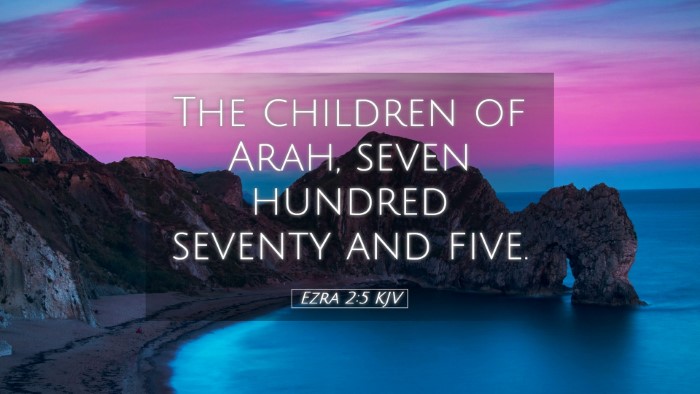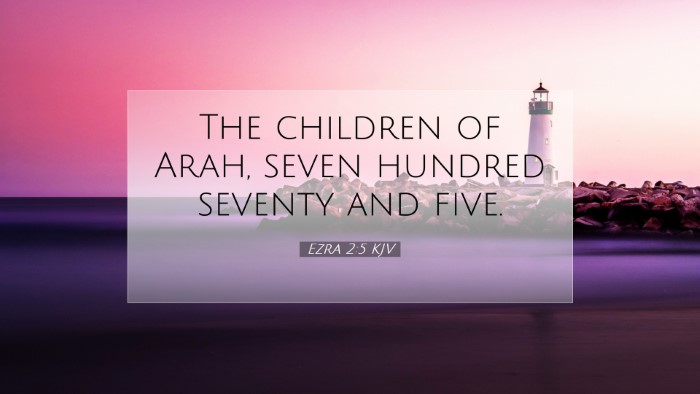Commentary on Ezra 2:5
Ezra 2:5 states: “The children of Phahath-moab, of the children of Jeshua and Joab, two thousand and eight hundred and twelve.” This verse is a part of the account that describes the families who returned from Babylonian captivity to Jerusalem and Judah. It emphasizes the organization and the numbers of those who were restored to their homeland.
Historical Context
The return from exile is a pivotal event in the history of Israel, signifying not merely a physical return but also a spiritual restoration to God. The genealogy provided serves to underscore the continuity of the Jewish identity and the importance of heritage in the restoration process.
Significance of Names
The names mentioned in this verse symbolize significant ancestral lines within Israel. Phahath-moab likely refers to a family group descending from Moabite women, illustrating the multi-ethnic composition of the returning exiles. This connection furthers the theme of inclusivity in God’s redemptive plan.
Commentary Insights
Several public domain commentaries provide meaningful insights into the verse:
Matthew Henry's Commentary
According to Matthew Henry, the listing of names and numbers reflects the faithfulness of God in preserving a remnant of Israel. It serves to remind readers of God’s promises and covenants made with His people. Henry points out that though the names may seem obscure, they recall God's providential care throughout generations.
Albert Barnes' Notes on the Bible
Albert Barnes highlights the importance of precise numbers in this passage. The specific count of individuals, “two thousand and eight hundred and twelve,” reflects the credibility of the account and the meticulous record-keeping that occurred during this restoration. Barnes emphasizes the importance of such details for understanding God’s work and His people’s response to His call for return.
Adam Clarke's Commentary
Adam Clarke elaborates on the two groups mentioned: the children of Jeshua and Joab. He notes that Jeshua, the high priest, signifies the spiritual leadership that would be instrumental in the restoration of worship and religious practices, while Joab may symbolize military readiness. Clarke views this duality as essential for the physical and spiritual rebuilding of Jerusalem.
Theological Implications
This verse points to essential theological truths that resonate across ages:
- God’s Faithfulness: The meticulous attention paid to genealogy and numbers signifies God’s unwavering faithfulness to His promises.
- Identity and Community: The specific groups named highlight the importance of communal identity, showing that every lineage contributes to the overall mission of God’s people.
- Restoration and Redemption: The act of returning signifies not just a physical re-entry but a deeper spiritual restoration. They were called back to fulfill God’s purpose.
Applications for Ministry
For pastors, students, and theologians, this passage can serve as a rich ground for reflection and application:
- Emphasizing Heritage: Understanding the importance of community heritage and identity in preaching and teaching.
- Recognizing God’s Work: Encouraging congregations to recognize God’s continuous work in their lives, just as He preserved the remnants of Israel.
- Celebrating Diversity: Acknowledging the diverse backgrounds represented in the congregation and affirming that all are part of God’s redemptive plan.
- Living Out Restoration: Challenging believers to live in a manner that reflects their restored status before God.
Conclusion
Ezra 2:5, while a mere listing of a group of returned exiles, encapsulates a profound truth about God’s unending faithfulness and the importance of community in His redemptive plan. As commentators reflect, each lineage and individual has significance in the unfolding story of salvation. This verse calls believers today to remember their roots, embrace their identity in Christ, and participate actively in the mission of the church.


